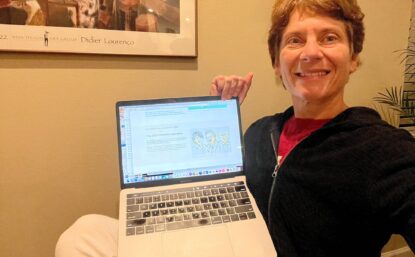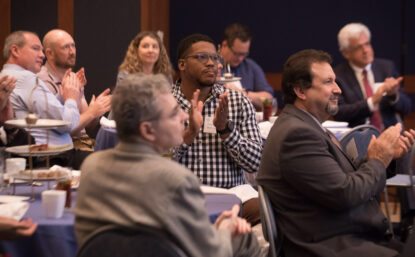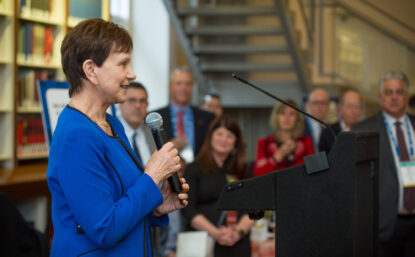Ullyot Public Affairs Lecture & Award
In 1990 chemist Glenn Edgar Ullyot endowed a public lecture with the Philadelphia Section of the American Chemical Society. The goal: that this annual lecture would inform the audience of how chemistry, biology, and the sciences in general contribute to the public welfare.
In the years since, esteemed scientists, journalists, government and business leaders, and even Nobel laureates have addressed audiences at this popular lecture. It is presented jointly by the Science History Institute (where the lecture has been held since 1997), the Department of Chemistry at the University of Pennsylvania, the Department of History and Sociology of Science at the University of Pennsylvania, the Department of Chemistry and Biochemistry at Saint Joseph’s University, and the Philadelphia Section and Delaware Section of the American Chemical Society.
The Ullyot Lecture & Award includes a Q&A session and the presentation of the Liberty Bowl.
2025 Ullyot Public Affairs Lecturer: Sir David W. C. MacMillan
Sir David W. C. MacMillan presented The Path to Invention and Discovery in Catalysis on November 19, 2025.
Sir David W. C. MacMillan was born in Bellshill, Scotland, and received his undergraduate degree in chemistry at the University of Glasgow, where he worked with Ernie Colvin. In 1990 he began his doctoral studies under the direction of Larry Overman at the University of California, Irvine, before undertaking a postdoctoral position with Dave Evans at Harvard University in 1996. He began his independent career at the University of California, Berkeley, in July of 1998 before moving to Caltech in 2000 as the Earle C. Anthony Chair of Organic Chemistry. In 2006 MacMillan joined Princeton University as the A. Barton Hepburn Professor of Chemistry. He served as department chair from 2010 to 2015 and is currently the James S. McDonnell Distinguished University Professor of Chemistry and a Ludwig Distinguished Scholar.
MacMillan shares the 2021 Nobel Prize in Chemistry with Benjamin List “for the development of asymmetric organocatalysis.” He was knighted by Queen Elizabeth II in July 2022. His research interests encompass a wide range of organic chemistry, including the development of new areas in organocatalysis and photoredox catalysis.
Ullyot Public Affairs Lecturers
- Omar Yaghi (2024)
- Carolyn Bertozzi (2023)
- Frances Arnold (2022)
- Peter Agre (2020)
- Roald Hoffmann (2019)
- Jennifer A. Doudna (2018)
- Marcia McNutt (2017)
- Sir James Fraser Stoddart (2016)
- Bruce Alberts (2015)
- George M. Whitesides (2014)
- Joe Palca (2013)
- Paul Anastas (2012)
- Michael Christman (2011)
- Susan Solomon (2010)
- Joseph M. DeSimone (2009)
- Bernard Bigot (2008)
- Shirley M. Tilghman (2007)
- Ralph J. Cicerone (2006)
- Marye Anne Fox (2005)
- Phillip A. Sharp (2004)
- Alfred Bader (2003)
- Jacqueline K. Barton (2002)
- Robert S. Langer (2001)
- Mark S. Wrighton (2000)
- George B. Rathmann (1999)
- Earnest W. Deavenport (1998)
- P. Roy Vagelos (1997)
- Harold E. Varmus (1996)
- Carl Djerassi (1995)
- Orlando A. Battista (1994)
- Bassam Z. Shakhashiri (1993)
- Maxine F. Singer (1992)
- Harry B. Gray (1991)
- Mary Lowe Good (1990)
About Our Copresenters
The Department of Chemistry at the University of Pennsylvania is composed of a dynamic community of researchers creating and disseminating new knowledge at the forefront of the chemical sciences. As an enabling science, chemistry is at the focal point of every important modern societal challenge. Our faculty and students engage these challenges daily on a local, national, and international scale.
The Department of History and Sociology of Science at the University of Pennsylvania uses the tools of the humanities and social sciences to study science, technology, medicine, and the environment. Through a broad range of scholarly projects, faculty research examines relations between the technical practice of scientists, engineers, medical researchers, and clinicians and the material, social, political, and cultural context in which those practices occur. Interdisciplinary study, faculty-student interaction, and individual mentoring characterize both the graduate and undergraduate programs.
The Department of Chemistry and Biochemistry at Saint Joseph’s University is the home of the chemistry, biochemistry, and pharmaceutical chemistry majors, and the chemistry, biochemistry, and bioinformatics minors. With expertise distributed over all five of chemistry’s primary areas, the faculty engage in diverse, award-winning teaching and research activities that prepare students for such future opportunities as employment in industry, science teaching, and postgraduate training in graduate schools, medical school, and law school.
The American Chemical Society (ACS) is a nonprofit organization chartered by the U.S. Congress. With more than 150,000 members, ACS is the world’s largest scientific society and a global leader in providing access to chemistry-related research through its multiple databases, peer-reviewed journals, and scientific conferences. Its main offices are in Washington, D.C., and Columbus, Ohio. The Philadelphia Section and Delaware Section are cosponsors of the Ullyot Public Affairs Lecture.



